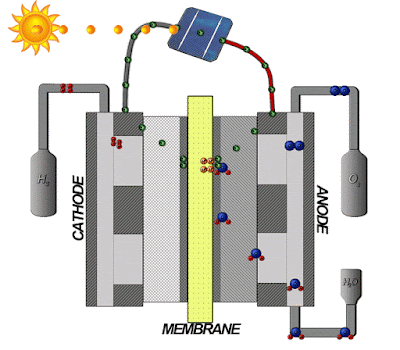Hydrogen
Gas cylinders might be coming to a LPG Gas Retailer very soon.
UTECH
(University of Technology) recently held a conference on the use of Hydrogen
gas on Tuesday November 3rd 2015 as reported in the article “International
Hydrogen Conference Opens at UTech”, published November 4, 2015 By Denise
Dennis, The Jamaica Information Service.
The
International conference, the first of its kind in Jamaica, was held over a two
(2) day period and was themed “The Hydrogen Economy: A Sustainable Energy Diversification
Option for the Caribbean”. It’s not a simple talk shop; members from Europe,
North America and the Caribbean were also in the conference to hear UTECH
progress on Hydrogen usage as a replacement for Cooking Gas.
It
marked the three (3) years since UTECH had received some JA$59 million worth of
funding back in 2012 to do research into Hydrogen to replace LPG used in Cooking
Gas cylinders as reported in my blog article
entitled “Why
UTECH, GOJ and UWI developing Hydrogen Cooking Gas Cylinders for
Hydrogen-Electron Economy”.
Those
funds had been given to UTech’s Faculty of Engineering and Computing Energy
Unit Research Team (CSEII) by the European Union (EU) Caribbean and Pacific
Research Programme for Sustainable Development.
It
was jointly conducted with assistance from the UWI (University of the West
Indies) along with BSJ (Bureau of Standards Jamaica) who focused on creating a
regulatory guideline for its use in Jamaica with United Kingdom-based Brunel
University lending a hand with their research facilities.
Minister
of Science, Technology, Energy and Mining Phillip Paulwell, spoke of the
research being done to develope a practical replacement for an essential dinner
time ritual and save us on our Oil bill to boot, quote: “We now have pride of
place among the scientists mostly from developed countries, with well-resourced
research facilities and long traditions of scientific inventions. This
motivation is reinforced by the prohibitive cost of imported oil and its
deleterious impact on the environment…It is within this context that the
potential of hydrogen as an alternative fuel source, must be recognised and
appreciated”.
So
what's new since 2012?
UTECH and Hydrogen as Cooking
Gas – How Hydride Salts can make Hydrogen Cooking Gas possible
They’ve
clearly made some progress, as at the two (2) day conference, they had displays
showing Hydrogen being used to cook food.
We
still don't have Hydrogen for use as a replacement for LPG in Cooking Gas or
even as a fuel for motor vehicles. Granted, the use of hydrogen would lower
emissions of greenhouse gasses. It would also reduce our dependence on imported
fossil fuels and allow us to achieve the National Energy Policy target of 30%
renewables by 2030.
As
a fuel, Hydrogen is sustainable, as it’s easily extracted via electrolysis’ of
water. The Problem is the energy used to split those bonds is considerably more
than the energy produced as Hydrogen, which has a boiling point of -252.9 C,
will gradually boil away no matter what type of tank it is stored in, mainly
for safety reasons.
This
must have been reflected in the cost-benefit analysis for the use of hydrogen
for domestic cooking. Creating the necessary legislation required for use as Cooking
Gas as well as electricity generation will take a while, as a means need to be
developed to liberate Hydrogen on site and solve the Energy Transportation
problem associated with this volatile gas.
They
use PEM (Polymer electrolyte membrane) a technology developed by GM (General
Motors) back in the 60's powered by solar energy. Because of the High current
density and the very thin membrane, it has a large surface are that is able to
produce Hydrogen and oxygen gas separately once solar or Wind Energy is used as
the power source.
This
means that if UTECH and their researchers have solved the production problem,
then the Storage of Hydrogen should be the next problem that they must tackle,
as Hydrogen cannot be stored as a Gas. It leaks too easily out of any container
and as it burns with a colorless flame, it can easily be aflame and go
unnoticed, possibly resulting in a massive explosion.
Thus
converting Hydrogen to another form, such as a hydride salt and then reacting
it to get water, would make more sense, as this would make it more concentrated
and easier to store at Room Temperature safely. Examples of such Hydride salts
include:
1.
Sodium borohydride (NaBH4)
2.
Sodium silicate (Na2O3Si)
3.
Lithium hydride (LiH)
4.
Magnesium hydride (MgH2)
These
storage forms, especially the hydrides, are very reactive to water and liberate
Hydrogen gas. This Hydrogen gas can then be run through a PEM (Proton Exchange
Membrane) to produce electricity, as in the case of Apple's patent for a
Hydrogen fuel cell to power their Laptops and smartphones as reported in my blog article
entitled “Apple
files patent for Hydrogen Fuel cell – Why Portable Hydrogen Fuel Cells needed
to cut the Analog Power Cord”.
A
similar idea can be used for Cooking Gas Cylinders, with Ethyl Mercaptan (CH3CH2SH)
being added to give it a distinct smell like Cooking Gas so as to avoid
Hydrogen gas explosions. Gas stoves would have to be modified in order to burn
Hydrogen, as well as the seals would have to be changed as it gas leaks easily
through most valves.
Using
these modifications both in Cooking Gas cylinders as well as in motor vehicles,
we might soon be cooking with Hydrogen gas by 2020.
Here's
the link:




No comments:
Post a Comment